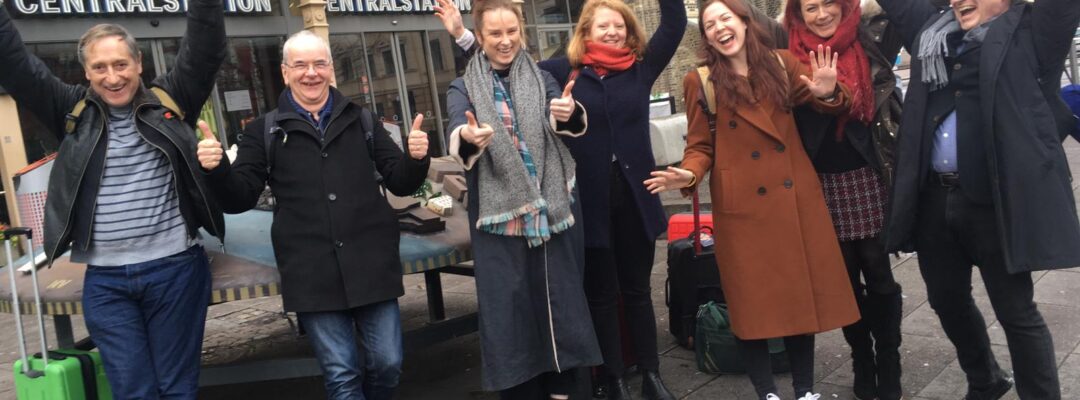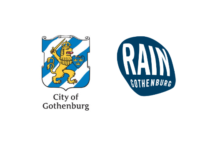In November, five colleagues from Scotland, two from Dublin and three from Ghent in Belgium travelled by train to Gothenburg in Sweden for the second of four Cultural Adaptations workshops. This blog comes from our Scottish partners, Creative Carbon Scotland, and their Director, Ben Twist.
It was a long journey (two days +) from Scotland and Ireland, but provided an ideal opportunity to put Creative Carbon Scotland’s money where my mouth has been for some time now, as I have argued that the cultural sector, and everyone else, needs to cut back on air travel in response to the climate emergency. In a previous blog I provided some tips about how to plan and book a long distance train journey, so in this one I’ll write about the experience, challenges and pleasures of the trip.
As I’ll explain below it wasn’t totally smooth and I recognise that train travel for work reasons is not feasible for everyone; some of our team did fly because they had work and family commitments. The trip from Scotland or Ireland to Gothenburg goes via London, Brussels (overnight), Hamburg and Copenhagen (overnight). On the way, because of time zones and schedules, it is two and a half days; on the way back, you can do it in two days, overnighting at Hamburg. See Seat61.com here for advice.
Costs
I have to admit it was costly, compared to flying – though the comparison is probably not quite as bad as you’d think. For the five from Creative Carbon Scotland to get from Edinburgh city centre to Gothenburg city centre it cost just over £350 each, including overnights (although not food). The cost of a return flight with baggage for one of our colleagues who flew was £366, but you need to add to that the cost of getting to and from the airports at each end, and the fact that his flights meant that he couldn’t attend the first (admittedly optional) event of the meeting. To do so he’d have had to leave at an unearthly hour to catch a more expensive flight, which would probably have meant a night in a hotel, or to have travelled the day before and overnight in Gothenburg, adding to the costs. There are very cheap flights from Edinburgh to Gothenburg, but only on certain days, so he had to go via Frankfurt, probably doubling his carbon emissions.
Time
Again, I have to admit it was a long trip, which not everyone could take the time to do (freelancers for whom every lost day of work costs them even more; people with small children, people whose quite unreasonable employers won’t let them have that sort of time etc.). Taking the flight via Frankfurt, it meant leaving central Edinburgh by about 11am and our colleague arrived at about 10pm local time, so ten hours in total.
Equalities
If you use a wheelchair or have other mobility impairments, if you’re blind or have other disabilities, such a long journey would be very difficult, if not impossible: the sheer number of changes, some quite tight, the getting to and from hotels etc and the working out of what to do if a cancellation or delay occurs would make it very tricky.
Use of time
This was interesting. I’m a good worker on trains – I set writing and reading work aside that I know I can do without perfect wi-fi and that needs a period of undisturbed concentration. I sit myself down in a window seat with a table and just get to it. I did some useful work of that sort on this trip, but less than I had planned, largely I think because I was travelling with more people and we kept having good conversations! It was also at the weekend, which probably meant I felt less required to work.
There were some disruptions to our travel, which meant I had fewer tables to work at and busier trains. But this turned out to be great bonding time: arriving at Flensburg (in Schleswig-Holstein, near the German/Danish border, since you ask) just as the café was closing, we had to transfer to a dreaded Bus Replacement Service (I thought these were characteristic of the UK, but apparently not) because our train from Hamburg had broken down. We all bought wine and snacks and had a great time, devising quizzes, playing games and generally getting to know each other, finally arriving in Copenhagen very late at 1.30am. I genuinely think this had a positive impact on the transnational meeting, as we had done quite a lot of the initial getting to know each other and had had some very useful discussions on the way.
The tips and lessons
This was a useful experiment. We learned a great deal about what it means to undertake this sort of trip by train and gained some useful tips (i.e. stay in hotels close to the station! avoid Deutsche Bahn!). Generally, I had a good time and I think my fellow travellers did too. We certainly got to know each other better, in a way which I think would be unusual in the rest of our work lives.
On the other hand, unlike getting to Belgium, the Netherlands, western Germany and most of France, which you can easily reach in a day, it’s difficult to recommend travelling to Sweden from Scotland by train rather than air because of the financial and the time issues. But I’d argue that this should make us ask whether trips are necessary and appropriate, rather than that we should just board planes without due consideration.
I’m not the only one to make this claim: we all know about Coldplay deciding not to tour until they can sort out the carbon emissions; and Massive Attack are mapping the impacts of their touring. Less publicised is change in the fairly conservative world of classical music: as the agent Jasper Parrott wrote in the Guardian in December: ‘Musicians and artists need to be disruptive in challenging assumptions about how our industry operates – and we all need to make real changes.’ When classical music agents, who make their money out of sending large numbers of players abroad, are getting with the project, something at last is happening.
Amateo, the European Network for Active Participation in Cultural Activities, managed by Jim Tough, recently encouraged members to travel to (possibly easier to reach than Sweden) Utrecht in the Netherlands by sustainable means, and the Informal European Theatre Meeting has been talking to Creative Carbon Scotland about how it reconciles the challenge of climate change with its structure of members from over 50 countries meeting regularly in different parts of Europe.















